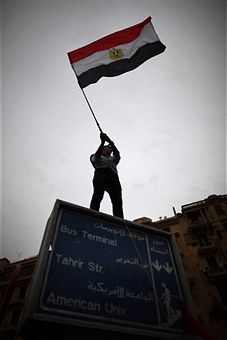 While analysts and diplomats are wondering who will win the forthcoming Egyptian
presidential election, the military junta (the Supreme Council for the Armed Forces, or SCAF) that runs the country has organised a poll on their Facebook page. More than 200,000 people seem to have taken part. And even accounting for the
obvious deficiencies (e.g. the bias towards an unrepresentative, internet-savvy, and liberal electorate) and bearing in mind the near-certainty of fraud given that the SCAF’s FB site is run
by military intelligence, the results are interesting nonetheless.
While analysts and diplomats are wondering who will win the forthcoming Egyptian
presidential election, the military junta (the Supreme Council for the Armed Forces, or SCAF) that runs the country has organised a poll on their Facebook page. More than 200,000 people seem to have taken part. And even accounting for the
obvious deficiencies (e.g. the bias towards an unrepresentative, internet-savvy, and liberal electorate) and bearing in mind the near-certainty of fraud given that the SCAF’s FB site is run
by military intelligence, the results are interesting nonetheless.
Topping the poll is, not unexpectedly, Mohammed El Baradei, the former head of the IAEA, whose internet-connected supporters have put him on 31 percent. But following him on 21 percent is a man who has no campaign, has not yet declared and who simply said last week that he was considering running: Mohammed Selim al-Awa. An Islamic scholar, and former head of the International Union for Muslim Scholars based in London, al-Awa’s popularity is intriguing. I have met several Tahrir Square activists who think that if al-Awa was to declare officially or join forces on a “ticket” with someone else, perhaps El Baradei, his chances of electoral success would be very high.
Third in the poll is Ahmed Shafik, a former prime minister. This is surprising. Shafik is the former air force commander and served as PM for an interim period. He previously won acclaim by upgrading Cairo’s airport and modernising EgyptAir. But 12 percent? I wonder whether this is not a product of his position in the poll: as the first candidate on the list, many people will press his name just to try the poll, only later realising that their vote was cast.
Coming fourth on 10 percent is Hazem Salah Abu Ismail from the Muslim Brotherhood. The Brethren have said they do not intend to field an official candidate, but Ismail’s popularity is a clear sign of their power, even on the net. In fifth place, taking 7 percent, is Ayman Nour, the former presidential candidate who braved Hosni Mubarak’s thugs and spent time in jail after having garnered half a million votes in the last presidential election. His party, however, has fractured and it is unclear, given his jail term, whether he can stand for office. Current rules say not. The sixth-highest scorer is Amr Moussa, the Secretary-General of the Arab League. A consummate performer, who, unlike El Baradei, speaks in a language ordinary Egyptians understand, Moussa is thought to be the real front-runner. But, at 6 percent, he clearly suffers from having no party to back him and could be punished for his association with Hosni Mubarak, under whom he served.
Then come the runners-up about whom it is worth picking up on a few things. The man seen as the military’s candidate gets very little support and the same goes for independents like Hisham Bastawisi, an appeals-court judge with conservative leanings.
Though the Egyptian military is coming under increasing pressure to hold presidential elections first and parliamentary elections second, this is unlikely to happen. If the SCAF stick to the original timetable, the legislature will determine the powers of the executive and the legislature. The likelihood is that the Muslim Brotherhood and a couple of other parties, who look set to form a majority coalition in the new legislature, will opt for a weaker president and a stronger government, like the system that operates in Turkey. In that case, many of the would-be presidential candidates will probably find that the job is not as they thought. Equally, the voters might change their minds depending on what the job actually entails. The situation is, therefore, very fluid.






Comments